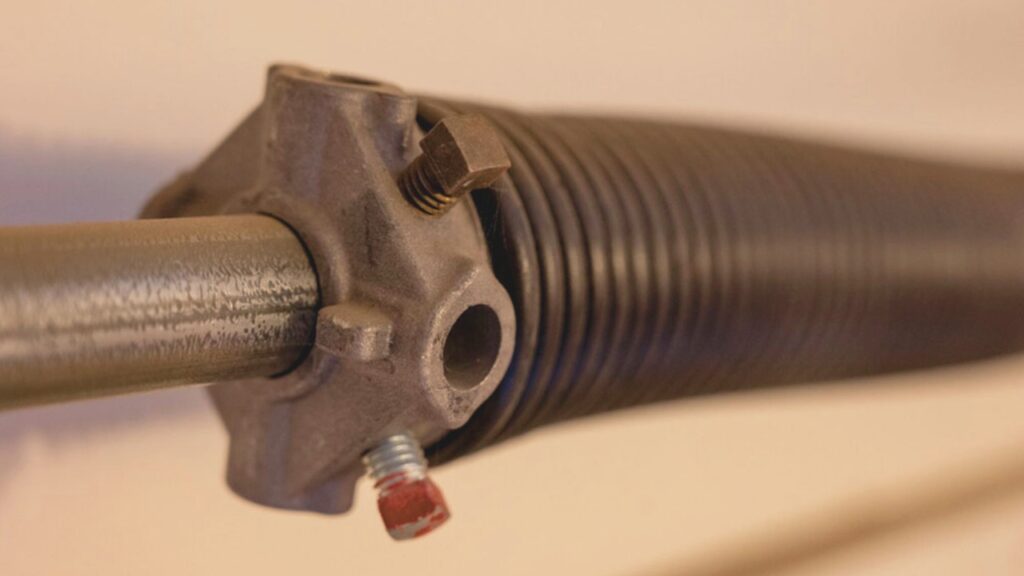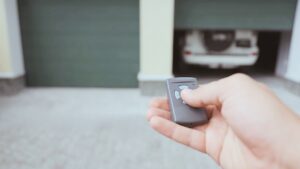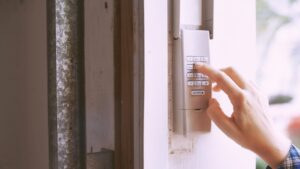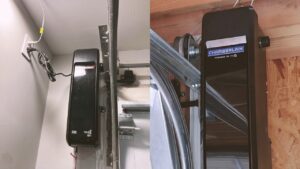Have you noticed any strange behavior with your garage door lately? Does it seem more difficult to open or close than before? If so, you might have broken or faulty garage door springs.
Garage door springs play a crucial role in the smooth operation of your garage door. They counterbalance, supporting the door’s weight and making it easier to open and close. However, these springs can deteriorate and eventually fail, leading to potential safety hazards and inconvenience over time.
So, how do I know if my garage door springs need to be replaced? In this guide, we explore key indicators and their causes to help you determine if your garage door springs need to be replaced.
How Do I Know If My Garage Door Springs Need To Be Replaced?
There are various ways to tell if you have a broken garage door spring. Although some may require the help of a professional, others are easy to tell. Below are ten signs of a broken garage door spring:
1. Loud Noises When Opening or Closing
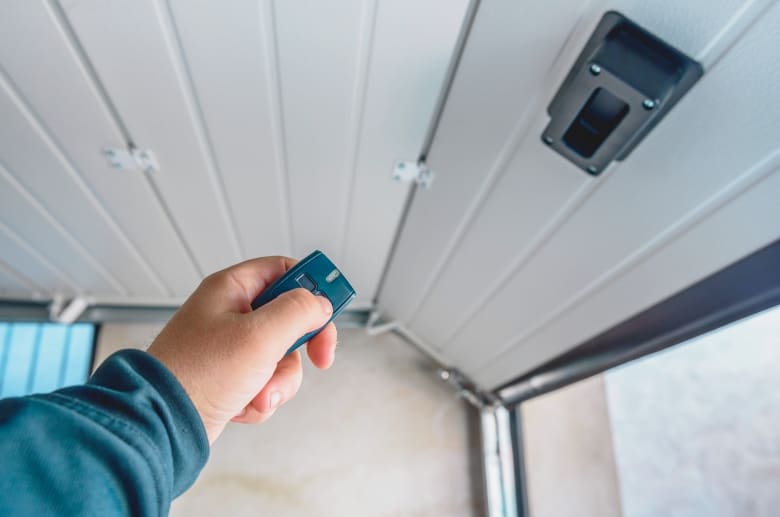
A loud bang or snapping sound when opening and closing your garage door indicates you have a broken spring.
Garage door springs are tightly wound to support the door’s weight, and when one breaks, the remaining spring is left to bear the entire load. This causes it to strain and release its stored energy suddenly, resulting in loud noise.
Connect With A Garage Expert
Connect with local experts, Compare quotes, Get the best price.
2. Difficulty Opening or Closing the Garage Door
Typically, garage doors have either torsion springs or extension springs mechanisms that help counterbalance the weight of the door, making it easier to open and close. If one spring breaks, the door may become unbalanced, which could make it difficult to open manually or put pressure on the garage door opener.
As a result, you may experience increased resistance when trying to open or close the door manually.
3. Unexpected Movement in the Garage Door Track
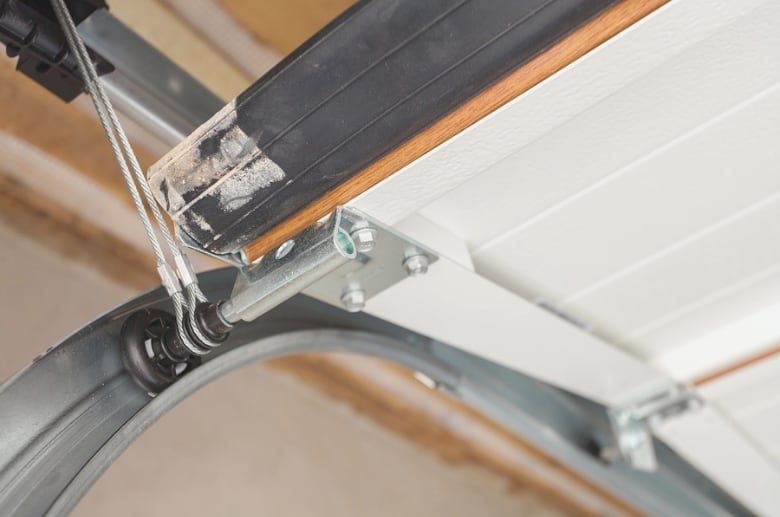
There are two types of garage door springs: torsion springs and extension springs. Torsion springs are usually placed inside a shaft above the garage door, whereas extension springs are positioned on both sides of the door. Their purpose is to balance the weight of the door, making it easier to open and close.
When either of the springs breaks, they can lead to your garage door going off track during operation and exhibiting unpredictable movements, such as:
- Tilting to one side,
- Becoming crooked, or
- Experiencing jerky motions as it opens or closes.
4. Rust or Corrosion Along the Length of the Garage Door Spring
A broken spring can contribute to the development of rust or corrosion over time by creating gaps or openings within the coils where moisture can accumulate. Moisture, in conjunction with environmental factors like humidity, promotes the oxidation process, leading to rust and corrosion along the length of the spring.
Once rust or corrosion sets in, it weakens the structural integrity of the spring and compromises its ability to support the garage door effectively.
5. Sagging or Unevenly Balanced Door Panels
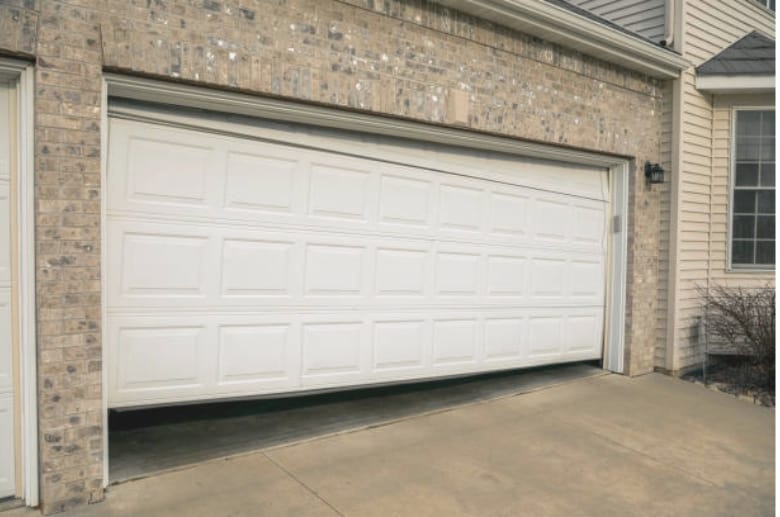
If a spring breaks, the door’s system will become unbalanced, causing one side to appear lower than the other. This can result in noticeable gaps or misalignment between panels, making it difficult to open or close the door smoothly.
The imbalance of a garage door system can also cause strain on other components like hinges and rollers, leading to early wear and eventual failure.
6. Visible Damage to the Springs
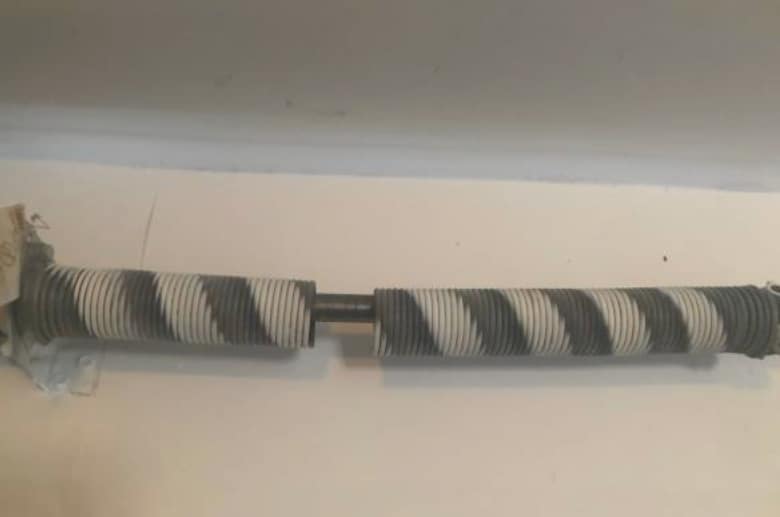
Like in most garage door components, cracks, gaps, or deformation indicate the garage door spring is broken or damaged. Springs undergo significant tension and stress during the garage door operation—they can weaken or wear out over time.
Ensure you regularly inspect the springs to identify visible damages and have them replaced by a professional early on.
7. Uneven Weight Distribution When Operating the Door Manually
When opening manually, do you find your garage door heavy to lift on one side? It’s most likely the door springs are broken. The garage door springs distribute the door’s weight evenly, making it easier to open and close manually.
When the springs are intact and functioning correctly, they provide the necessary counterbalance to support the door’s weight. They also assist in offsetting the force of gravity and reducing the physical effort required to lift or lower the door.
8. The Door Falls Faster and Harder than Usual When Released from Its Opener
If you are experiencing this kind of “fast closing” from your garage door, it should be enough to raise the alarm and have your springs checked by an expert. Garage door springs help regulate the speed and control of the door’s descent. They also counterbalance, offsetting the door’s mass and providing a controlled lowering motion.
When your springs are broken, this balance and control are disrupted, causing the door to drop rapidly when released from the opener. This sudden and uncontrolled descent poses safety risks and can potentially cause damage to the door and its components.
Connect With A Garage Expert
Connect with local experts, Compare quotes, Get the best price.
9. Vibration Coming From Inside the Springs While Opening or Closing
Small vibrations should be okay when operating your garage door. However, too much of it should be an issue, mostly caused by broken springs. When your springs are broken, they strain the garage door, resulting in heavy vibrations during the opening and closing of the door.
Ensure you seek professional assistance to inspect the springs, determine the extent of the damage, and install suitable replacement springs.
10. Significant Changes in Electric Opener Performance
Suppose you experience a drastic change with your electric opener, like struggling to lift the door, taking longer than usual to open or close, or producing unusual sounds during operation. In that case, you might have a broken spring.
When a spring breaks or becomes damaged, it strains the opener, affecting its performance. If you observe significant changes in the performance of your electric opener, it is crucial to have the garage door springs inspected by a professional technician.
Causes Of A Broken Garage Door Spring
There are several reasons why a garage door spring may break. The following are the most common causes that lead to garage door spring failure.
Wear and Tear
Nothing escapes the effects of wear and tear over time, not even garage door springs. The springs bear the door’s weight and undergo significant tension with each use.
Stretching and contracting the springs repeatedly can weaken them, causing metal fatigue. As a result, cracks, fractures, and even complete breakage can occur, making the springs unable to support the door’s weight.
Other factors, like the frequency of use, the weight of the door, and the quality of the springs, also influence the rate at which wear and tear occurs. And although most garage door springs are typically rated for about 10,000 to 20,000 cycles, they become increasingly susceptible to breaking once they exceed this lifespan.
Rust and Corrosion
As rust accumulates on the surface of the springs, it creates rough patches and compromises the smooth movement of the coils. The friction generated by the rough surfaces leads to increased wear and stress on the springs, causing them to weaken and eventually break.
However, regular maintenance and prevention strategies can help mitigate the effects of rust and corrosion on garage door springs.
Incorrect Installation Process or Use of Wrong Spring Size
Using the wrong spring size during the garage door installation can cause an imbalance in the system, leading to unnecessary strain on the springs. This can result in premature wear and breakage.
Inadequate materials, such as low-quality or worn-out springs, can also contribute to their failure. Springs made from substandard materials may lack the strength and durability to withstand the constant tension and cycles of use.
Ensure you rely on experienced professionals or reputable suppliers to install garage door springs. Check for their qualifications, certifications, and customer reviews to ensure their expertise and reliability.
Improper Maintenance
How often do you take an extra minute to properly maintain your garage door springs? Like every other component in your home, garage door springs require maximum attention and maintenance for optimum functioning.
Neglecting routine maintenance tasks such as lubrication, tension adjustments, and general upkeep can lead to increased wear and tear, weakening the springs and potentially causing them to break.
We recommend following the manufacturer’s guidelines for lubrication and maintenance intervals to prevent broken springs due to improper maintenance. If you detect any issues, address them promptly by seeking professional assistance or performing necessary repairs.
Conclusion
Broken springs can cause inconvenience in operating your garage door and pose safety risks. If not addressed promptly, they can lead to costly repairs, like damage to other garage door system components.
To avoid these issues in the future, ensure you pay close attention to potential signs, like loud noises, rust/corrosion, and changes in performance. We also recommend seeking a professional for your garage door spring installation and maintenance.
Frequently Asked Questions
Some frequently asked questions about whether garage door springs need to be replaced include the following.
How Do You Open a Garage Door with a Broken Spring?
It is best to refrain from attempting to open the door manually or with the assistance of a garage door opener if you suspect a broken spring. Operating the door without a broken spring can be extremely dangerous and may lead to potential damage or injury.
Instead, contact a garage door technician to assess the situation and safely replace the broken spring before opening it.
Can You Open a Garage Door With One Spring Broken?
It is possible to open a garage door with a broken spring. However, you will require extra manual effort and caution since the door becomes heavier and lacks the proper counterbalance.
Nevertheless, we don’t endorse opening your garage door with one broken spring for safety reasons. Instead, seek professional assistance from a reputable garage door repair service.
Can I Replace Garage Door Spring Myself?
Although it might be possible to replace the garage door springs yourself, it’s crucial to note that it can be a complex and potentially dangerous task. Spring replacement requires specialized knowledge, tools, and experience to ensure proper installation and safe operation of the door.
Therefore, it is highly recommended to seek professional assistance from a qualified garage door technician.

